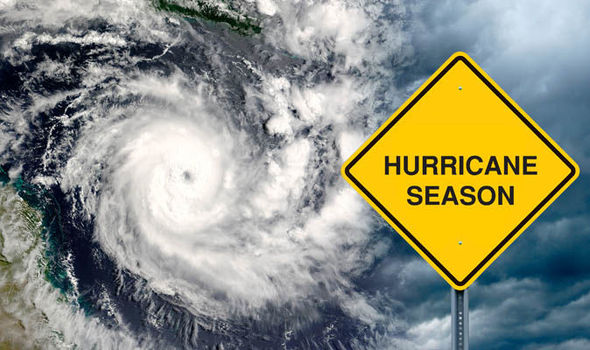
Governor Brian Kemp, Insurance Commissioner John King, and Georgia Emergency Management and Homeland Security Agency Director Homer Bryson are reminding Georgians to remain vigilant and follow best practices as Hurricane Isaias approaches the state’s coastal region over the next few days.
According to national weather officials, Isaias is currently a Category 1 hurricane with maximum sustained winds of 75 miles per hour. It is still expected to remain off the eastern coast of Florida this weekend before turning north to northeastward and paralleling the Georgia coast on Monday. Right now, the probability of coastal Georgia experiencing anything more than minor impacts continues to be low, although any significant westward shift in the track forecast would increase those chances. Trends in the forecast track should continue to be monitored, but confidence in the forecast is increasing.
Some strengthening is possible today and tonight, and Isaias is expected to remain a hurricane for the next few days. Tropical Storm Warnings and a Hurricane Watch have been issued for portions of Southeast Florida. A Tropical Storm Watch will likely be issued for coastal Georgia this weekend, and potentially a Hurricane Watch. However, with tropical storm wind probabilities currently at 10% to 20% for the Georgia coast, a Tropical Storm Warning appears unlikely for Georgia at the moment. Those probabilities will likely increase as the storm approaches, but tropical storm conditions are not currently forecast along the Georgia coast.
Impacts along the immediate Georgia coast on Sunday and Monday include dangerous and life-threatening rip currents and marine conditions, sustained winds up to 25 miles per hour with gusts up to 25 miles per hour, and up to two inches of rainfall.
GEMA/HS offers an informational website – https://gema.georgia.gov/hurricanes – with tips on storm preparedness before, during, and after a hurricane. Some of those tips are included below.
Before A Hurricane
Get a Ready Kit and prepare a portable Ready kit in case you have to evacuate.
Make an evacuation plan for your family.
Prepare to secure your property.
If you have a car, fill the gas tank in case you have to evacuate.
Plan ahead for your pets. Shelters cannot accept pets due to health reasons, so it is important to find a pet-friendly hotel or make arrangements with family or friends in advance.
Know your area’s flood risk. If unsure, call your local emergency management agency or planning and zoning department, or visit Flood Smart.
Property insurance does not typically cover flood damage. Talk to your insurance provider about your policy and consider if you need additional coverage.
During a Hurricane
Listen to the radio or TV.
Secure your home, close storm shutters, and secure outdoor objects.
Turn off utilities if instructed to do so. Otherwise, turn the refrigerator thermostat to its coldest setting and keep its doors closed.
Turn off propane tanks.
Avoid using the phone except for serious emergencies.
Have a supply of water for sanitary purposes, such as cleaning and flushing toilets. Fill the bathtub and other larger containers with water.
You should evacuate under the following conditions: if you are directed by local authorities to do so; if you live in a mobile home or temporary structure since such shelters are particularly hazardous during a hurricane no matter how well-fastened to the ground; if you live in a high-rise building since hurricane winds are stronger at higher elevations; or if you live on the coast, on a floodplain, near a river, or on an island waterway.
If you are unable to evacuate, go to your safe room. If you do not have one, stay indoors during the hurricane and away from windows and glass doors; close all interior doors; secure and brace external doors; avoid elevators; and take refuge in a small interior room, closet, or hallway on the lowest level. If flooding occurs, be prepared to take shelter on a floor above the flooding.
After A Hurricane
Local authorities may not immediately be able to provide information about what is happening and what you should do. However, you should listen to NOAA Weather Radio, watch TV, listen to the radio, or check the Internet often for official news and instructions as they become available.
Stay out of flood waters, if possible. The water may be contaminated or electrically charged. However, should you find yourself trapped in your vehicle in rising water, get out immediately and seek higher ground.
Be alert for tornadoes and flooding. If you see a funnel cloud or if local authorities issue a tornado warning, take shelter underground or in an interior room away from windows. If waters are rising quickly or local authorities issue a flood or flash flood warning, seek higher ground.
Stay away from downed power lines to avoid the risk of electric shock or electrocution.
Do not return to your home until local authorities say it is safe. Even after the hurricane and after flood waters recede, roads may be weakened and could collapse. Buildings may be unstable, and drinking water may be contaminated. Use common sense and exercise caution.

1 Comment
Leave a Reply
Cancel reply
Leave a Reply

Chattooga Opinions
Medically Supervised Weight Loss: Inside Premier Weight Loss & Medispa

Chattooga Local News
Georgia Power Files Plan for Customer Rate Decrease with Public Service Commission

Chattooga Local Government
Carr Pushes for Permanent Halt of Medicare and Medicaid Funding for Child Sex-Change Procedures

Bulloch Public Safety
01/26/2026 Booking Report for Bulloch County

Bulloch Public Safety
02/09/2026 Booking Report for Bulloch County

Bulloch Public Safety
02/16/2026 Booking Report for Bulloch County

Bulloch Public Safety
02/02/2026 Booking Report for Bulloch County

Bulloch Public Safety
01/30/2026 Booking Report for Bulloch County







Anna
August 3, 2020 at 1:10 pm
Yeah we got spit on but that is all. Good news. All the hurricane stuff will get used anyway. Hope for the best, prepare for the worst.